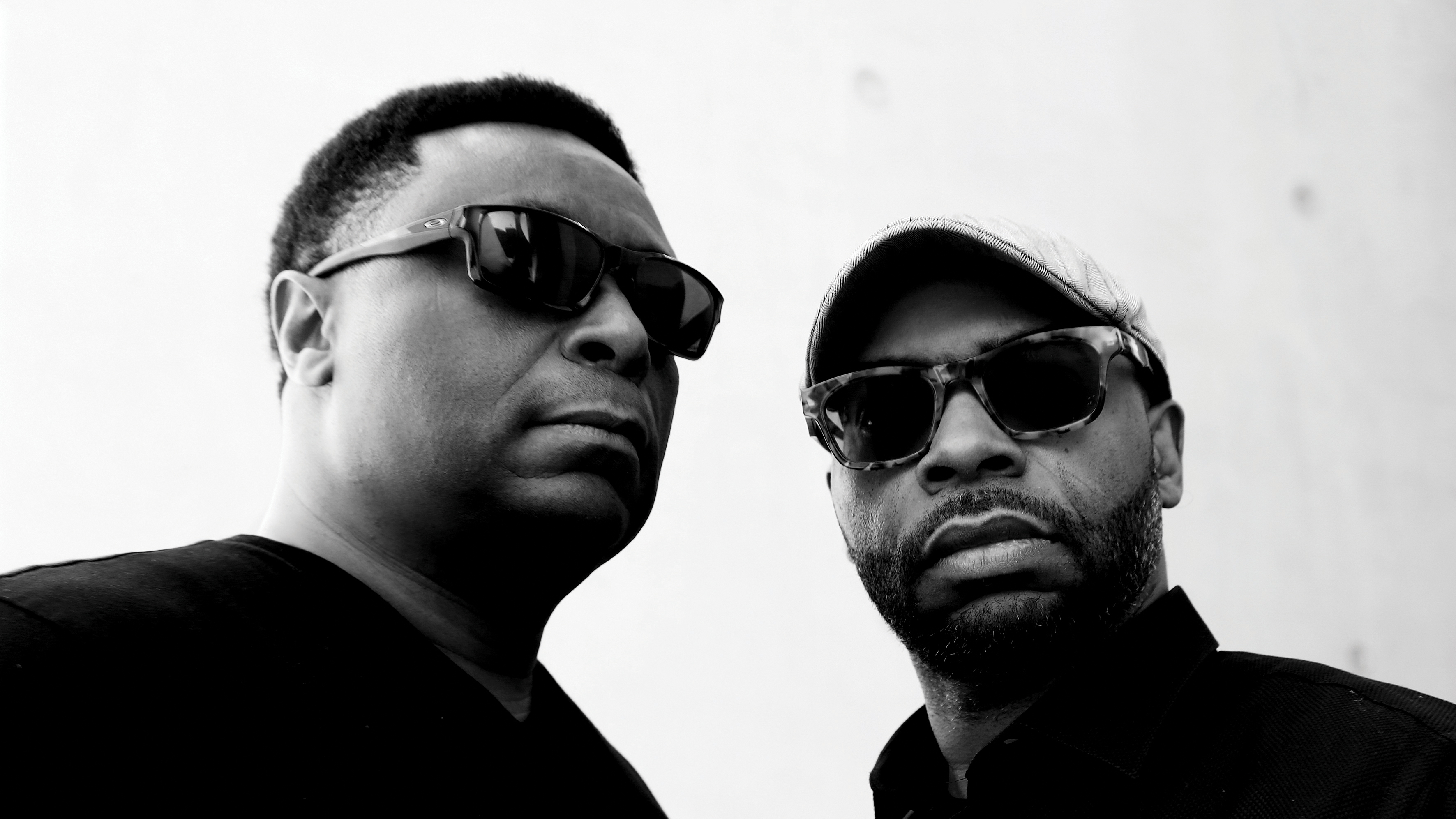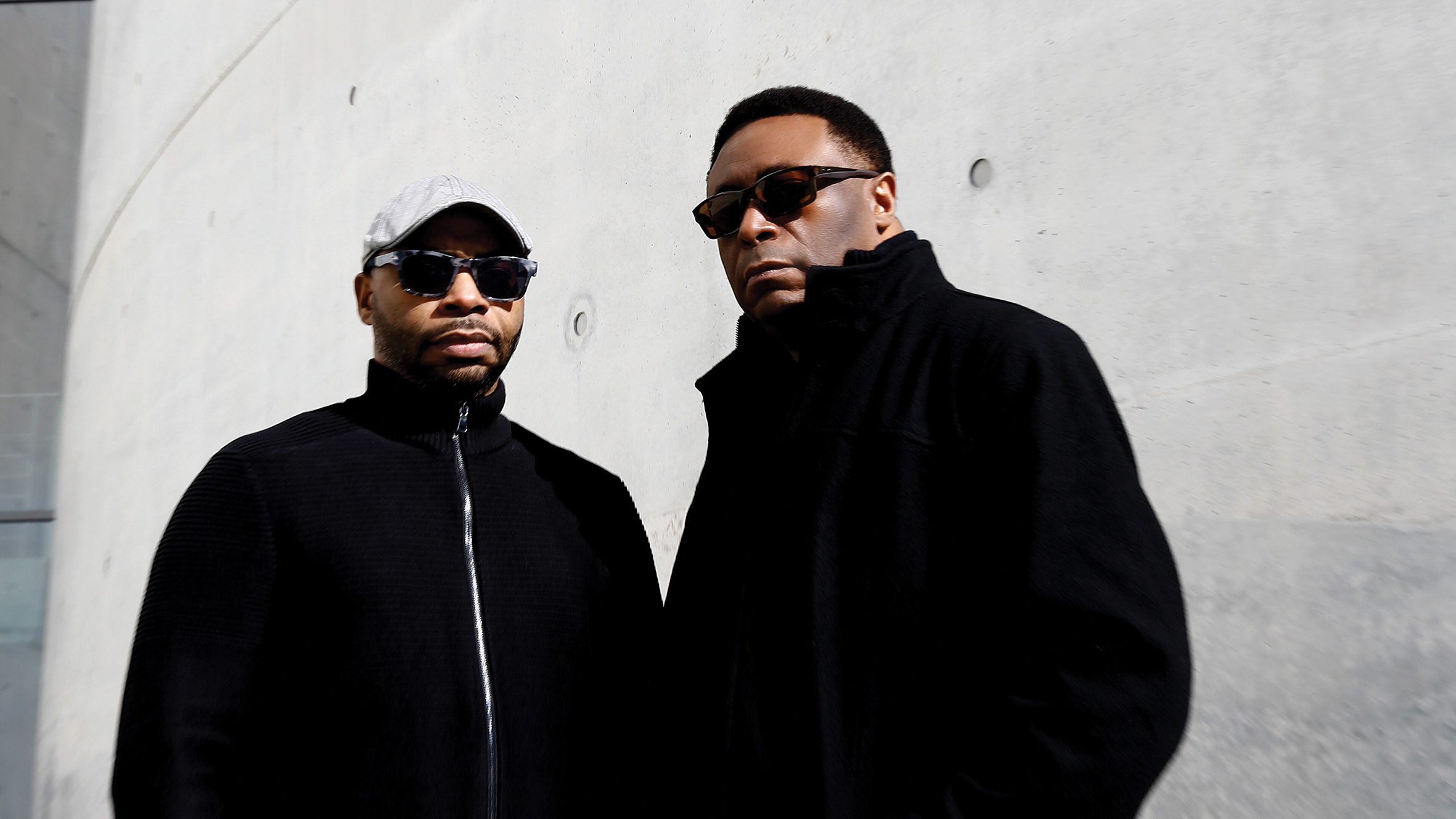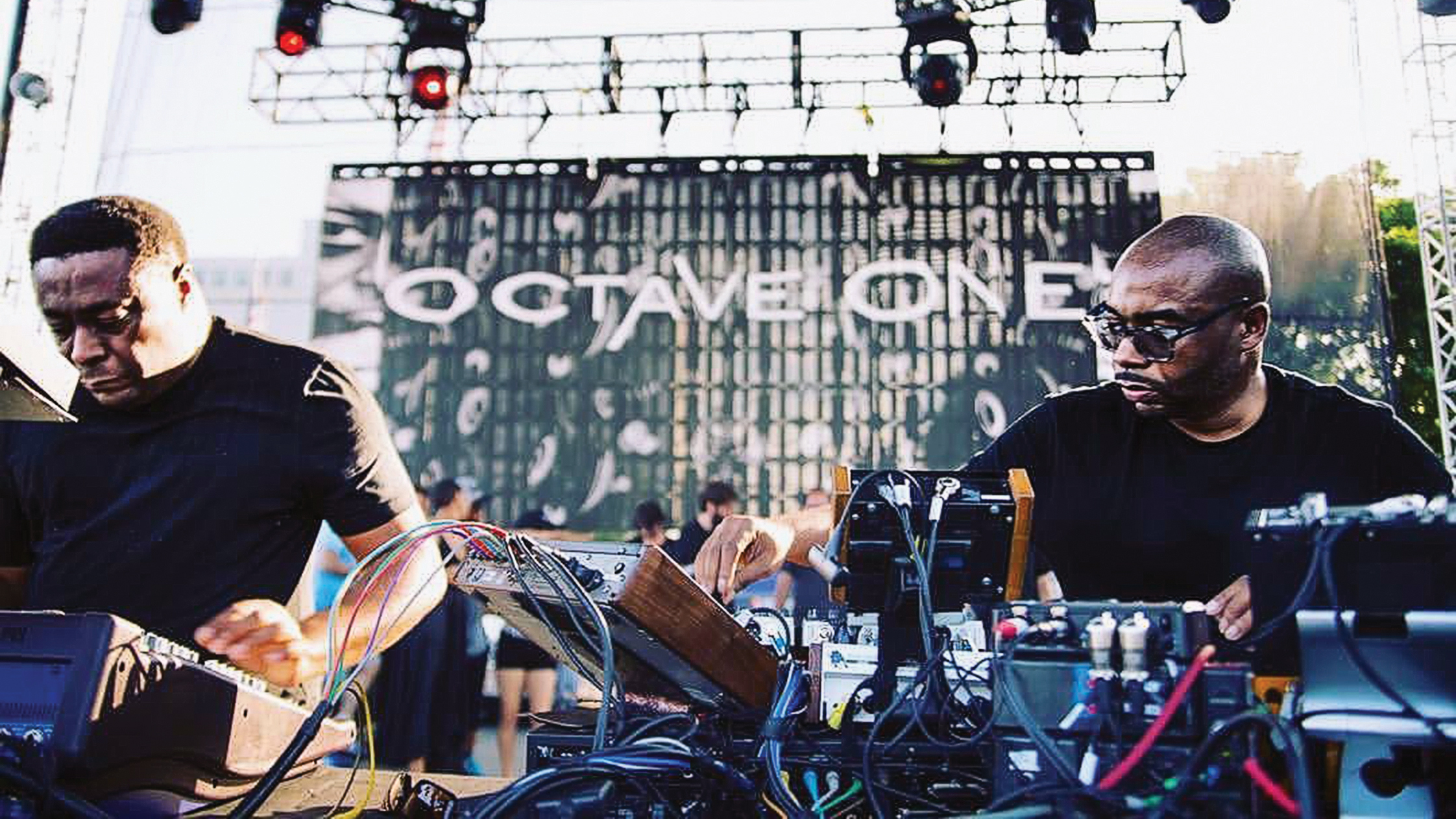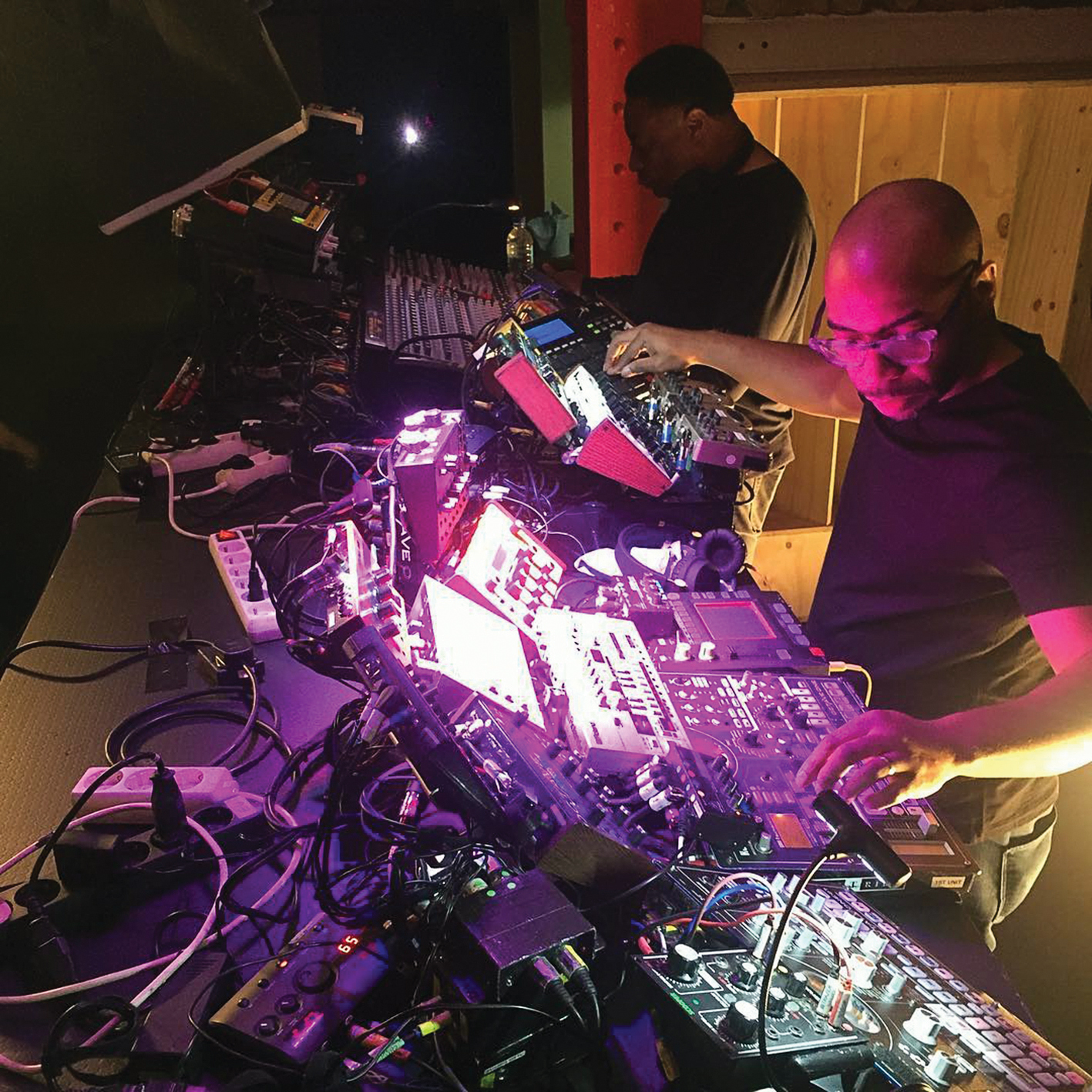
After debuting on Derrick May’s epic Transmat compilation Techno 2: The Next Generation with the lush-sounding single I Believe (1988), Lenny and Lawrence Burden grasped the nettle and started their own 430 West label.
Frequently assisted by brothers Lorne, Lynell and Lance, the duo’s commercial success peaked a decade later with the techno/house banger Black Water, and the Burden brothers have rarely been out of the spotlight since.
Recognised for their high-energy live sets employing an armoury of hardware synths and sequencers, their authentic approach to performing has continually enthused crowds on a global scale.
Meanwhile, Lenny and Lawrence continue to break their own musical boundaries with their latest album Never On Sunday – an intriguing blend of ambient, atmospheric and vocal-based electronica, accompanied by remixes from Orbital and Skream.

Growing up in Detroit, was the influence of techno pretty much inescapable?
Lenny: “When we started in 1989, our exposure to Detroit techno primarily came from the radio and clubs, but you could have easily escaped it because there wasn’t a lot of it. Derrick, Juan and Kevin were already established and the first techno album to give Detroit techno its name (Techno! The New Dance Sound Of Detroit) had just been released by Virgin. We were actually on the second album, Techno 2: The Next Generation, so we were technically part of the second wave and by then it had really started to spread.”
You have three other brothers that are into production, too. That must have been some household growing up?
Lawrence: “Having all of us in the house playing music could be kinda chaotic at times. My mum liked to have music in the house no matter how bad it was, but always wanted us to be involved in music. It was also a form of discipline because she could count on knowing exactly where we were.”
Did you share the same musical tastes?
Lenny: “Mostly the same, but not totally. I’m not a huge jazz fan, but Lawrence and Lynell actually worked as a roadie for Bob James. We were all exposed to soul and R’n’B at home, and stuff like Elton John. Basically, everything you could think of, so our tastes definitely collided a lot.”
Lawrence: “Lenny always liked the harder edged stuff and I had to learn to appreciate that because my taste was more jazz and R’n’B-heavy like Barry White and Al Green. There’s a nice age gap between all of us, so at some point our younger brothers Lance and Lorne brought in more of the hip-hop and the new style of R&B.”
What was the sequence of events that led to you to combine your talents as a duo and form Octave One?
Lenny: “We already had musical training from elementary school. Lawrence played saxophone in band classes and I played horns and drums. We actually started as a trio with my brother Lynell and took the same path as a lot of cats who made electronic music at the time. We bought some turntables, tons of records and started DJing and throwing parties.
It seemed amazing to us that we could make a whole song with just a few pieces of equipment
“A lot of the electronic music was made in basement studios with low budgets, so we bought a couple of drum machines and synthesisers and started teaching ourselves. It seemed amazing to us that we could make a whole song with just a few pieces of equipment.”
Lawrence: “Lenny and Lynell bought the first gear, but I wouldn’t put my money up because I was always the slack guy that mooched off anything that came into the house. They bought a Kawai R50 and Korg DD-1 drum machine and I started jamming and making drum solos out of those. Later, the guys bought the Roland TR-909 and 303.”
Lenny: “Actually, our first synth was a little toy Yamaha PSS-480. It had speakers on it and a solid bass like the Yamaha DX100, which made us want to track down one of those. We plugged it right into the amp.”
Lawrence: “Once we got the 909 I was hooked – that machine’s like a drug, so I’d run it into a speaker and play with it all day. I could listen to the kick for hours because the sound evolved as it played – it talked to you!”
How did you get signed to Derrick May’s Transmat label with your debut single I Believe with Lisa Newburry?
Lenny: “We used to send people cassette tapes so they could see what we were working on and got rejected quite a few times, but we were just working out of our apartment and learning.
“What’s really weird is that my neighbour was Marti Bonds who was in Model 500 with Juan Atkins and his roommate was Jay Denham who also ended up on Transmat as Fade to Black. Carl Craig’s sister lived upstairs, so we had our own little techno corner in our apartment building [laughs]. At first, I don’t think Derrick May even listened to our tape – Carl was the one who listened to it.”
Lawrence: “We met Carl at Alan Oldham’s house and started vibing and kicking it. From there, Carl pushed Derrick to listen to our music but I don’t think he got it. Anthony Shakir used to engineer at Metroplex Studios and when Juan Atkins went out of town, unbeknown to him, his brother Eric would start renting the studio out. So we’d pay Eric money to rent the studio and Anthony would engineer.
“That’s how the track I Believe came about, then Shakir sent our music with a bunch of other songs that were going to be on Techno 2: The Next Generation and Derrick picked it up from there.”
Around the same time, you started your own label, 430 West...
Lenny: “Apart from Richie Hawtin’s Plus 8 and Carl Craig’s Planet E, not that many people had started their own label back then. We did it out of necessity because Derrick didn’t put out a lot of music on Transmat and we were ready for our next release. In those days there was no internet or book you could read on how to put out or master a record, let alone figure out manufacturing and distribution. We just borrowed some money and a fax machine and ran completely blind.”
Lawrence: “Lenny had a job that gave us access to the mail, so we could send all the packaging off rather inexpensively. It’s funny because we were sending stuff overseas to people like Pete Tong all the time but had no idea who he was.”
When all the digital synths came out, people started unloading all of their analogue synths. We remember a time when they were pretty much giving it away
Lenny: “We were primarily a vinyl label – selling records was our bread and butter. We come from a time when even a bad record would sell a couple of thousand. The strange thing was that even before streaming started becoming popular, Richie Hawtin had showed us Vinyl Scratch where you could spin an MP3 with a vinyl record synced to a computer.
“We thought, what the heck, this can’t work? As things progress you learn to adapt, but record labels are not the same as they were by any stretch of the imagination. You have to change tactics when you can’t balance out the promotion of a record with sales.”
Lawrence: “Adapt or die – that’s what this industry is. 75% of our monetary gains came from sales, but a few years later it came from touring. Everything keeps morphing and shifting, so if you don’t adapt you’ll literally die off.”
Your second Octave One album The Theory Of Everything seemed to pull away from techno and move more into rap/trip-hop territory. What motivated that change in your music?
Lawrence: “We’d been playing with different genres and wanted to experiment but hadn’t always presented that to the public. The track Black Water gave us an opportunity to get into that new world, but we just do what we want to do.”
Lenny: “We’d always recorded in our homes, but suddenly had access to really good studios – you can’t go from working in your mother’s house to that and not try something. But our fan base is great; they’ve stayed with us and given us the opportunity to do what we want knowing that we’ll always come back to the Octave One sound.”
You had a surge of popularity with Black Water in 2000. Was that the trigger that allowed you to remix tracks for the likes of Massive Attack and Inner City?
Lenny: “It definitely expanded our audience, but we’d been doing remixes before that and already knew Kevin Saunderson from Inner City. We were even asked to do a remix for one of Depeche Mode’s anniversary albums and were looking at doing Behind The Wheel or some of the slower stuff that Martin Gore had going on, but we couldn’t stop to do it. They were basically our idols.”

Tell us about the new Octave One album Never On Sunday, which may confuse some people because you’ve also released music as Never On Sunday?
Lenny: “We’re always trying to push ourselves musically and thought that we’d stumbled on something interesting but got all shy about it and imagined it would be better to drop it as a Never On Sunday record. We even released a piece of vinyl a couple of years ago featuring some of those tracks and people really liked it, so during the pandemic we thought let’s just complete the idea and turn it into an Octave One record.”
Lawrence: “The pandemic gave us time to pause. We were doing so many shows and always trying to appeal to the dancefloor, but now we were at home and didn’t have to worry about that so we just let things flow and created for ourselves. That’s why a lot of the tracks sound a bit ‘out there’ – that’s the best way I can describe them.”
Can you be more specific about how you feel the album is different to previous Octave One releases?
Lenny: “We did some vocal tracks, slower tempo things and dance stuff and sent it off to people. Skream did a remix and so did Orbital, at which point we felt that this should really be an Octave One record and decided to make Never On Sunday the album title.”
Lawrence: “We actually did a Never On Sunday show in Rome that came out amazing. It was a lot of fun and the applause we got was crazy. Sometimes it’s just about timing, so when we saw the crowd reaction we thought people were ready for it.”
Apart from the remixes, the album’s not all that beat-driven. There are more instrumental tracks and some of it’s quite sci‑fi‑sounding?
Lenny: “As we were creating the record, we didn’t know what it was – we just knew it was us. It took us a while to get it to where it is now and probably mixed up to 10 different versions of every track. Today, music is so disposable and records only last a couple of weeks. When we made Black Water, the record was ancient before people started playing and understanding it, so we hope people will give this album a chance too and take the full journey. We’ve made ten videos for all of the tracks, so it’s a complete art project.”
Karina Mia adds vocals on three tracks. Was she involved from the very beginning?
Lenny: “When we did the show in Rome, we wanted to bring a vocalist out with us knowing that we wanted to have them on a few of the tracks. As brothers, we’re used to just working together, so when we bring in someone else we really need to feel that full energy. We’d met Karina before and liked how we vibed together, so when she came back to us with a complete vocal arrangement for a few of the tracks we realised that we had something.”
You mentioned Orbital previously who are also brothers and have famously struggled to work together at various points. How do you avoid confrontations?
Lawrence: “As the oldest I’m used to being quite bossy and have had to learn to let my brothers have their space. There is room for all of us; we just need to let each other breathe.”
Lenny: “It’s about recognising each other’s strengths and weaknesses and letting people express themselves in the way they need to. I understand what Paul and Phil from Orbital have been through because Lawrence and I are together a lot more than we are with our mates – especially when we’re on the road. I just have to be really conscious about when to back off a bit and let my man have his space.
“With so many boys in the family there’s always been a ton of fights, but as you get older you don’t want to fight anymore [laughs]. You want the music to be the best that it can be and we’re already strong together, so let’s just add to that strength. I’d rather survive with my brothers than without.”
You and Lawrence appear to have a very intuitive partnership – especially on stage…
Lenny: “A lot of why we fit together is accidental. Initially, I was supposed to play live by myself and Lawrence would DJ his set right before I was supposed to hit the stage. I had his mixing console and all of his gear in front of me and was trying to do everything myself when Lawrence jumped on stage. We hadn’t rehearsed anything, but ever since then he’s been behind the mixing desk and how we work together in the studio has been equally organic.”
We’ll use anything that we think is going to make a good sound – it doesn’t matter if it’s inside of a box or a big expensive piece of analogue hardware
Lawrence: “When we play live, gear is sometimes swapped out and Lenny will throw me a curveball, but it’s mainly about the mood of the venue and the people. We might have a base idea of what we like to do, but there are no rules. We play off each other and sometimes forget the crowd is even there. As long as you’re having a good time, it’ll translate to them.”
Do you have to be in the same room to make music?
Lenny: “During the pandemic we worked remotely a lot, especially as Lawrence lives about an hour away, but we work with all of our brothers when we make music – they’re our production partners. With Black Water, Lorne was the one who initiated the track; we just finished it. That’s the advantage we have over a lot of other bands. On this project, we were all in the studio and Lorne and Lawrence came in to play some things, so the songs came to us in lots of different ways.”
Does the TR-909 still play a prominent role in the studio?
Lawrence: “We don’t interchange gear. We might buy something and sell it years later, but with the 909 we always say that if we sell that then it’s over. We might trigger it or sample it, but if you listen to our music it’s always been 909-driven. That machine has a lot of warmth to it – even the claps are warm, so that will be the very last piece of gear we sell because we love it so much.”
Do you find it necessary to process the 909?
Lenny: “Initially we didn’t even know what a compressor was, but because we have so much stuff and records are no longer made the same way we have to process it. If you want your record to be played in the same set as someone else, you need to add compression and limiting, but initially we’d just add a little reverb and EQ on the board and let it go.”
How does the TR-8 compare?
Lenny: “We used the TR-8 a lot live and found that everything was right there in your face and you didn’t have to do a lot of menu diving. Sound-wise it was close, but the thing about the 909 is that each one has a distinctive sound of its own because it’s not a completely digital machine.
We know the characteristics of our 909 so well that we can even tell when people sample us
“We know the characteristics of our 909 so well that we can even tell when people sample us. The Roland architecture has that – everything is distinctive. One Juno 106 doesn’t sound like another because of the age and the fact that the components are wearing out and going out of tune. The TR-8S is a very good drum machine too, but it’s not a replacement for a 909.”
Which hardware synths are you most frequently using?
Lenny: “The Roland MKS-80, which is basically the rackmount version of the Super Jupiter, and the MKS-70, which is a version of the JX-10 (Super JX). We also like the Studio Electronics ATC-1, which is like a Moog but has four different filter cartridges – a Minimoog, TB-303, Arp 2600 and SEM. It’s a lot of fun making sounds out of that thing. We also use some soft synths from Native Instruments and run a lot of stuff through the Lexicon PCM42 digital delay.”
Where do you generally stand on plugins?
Lenny: “Soft synths definitely have their place, especially for when we’re on the road. We have tons of plugins. We’ll use anything that we think is going to make a good sound – it doesn’t matter if it’s inside of a box or a big expensive piece of analogue hardware. Two of our brothers use Maschine and we have the whole Komplete set from them – my job is to marry it all together and make sure that it all makes sense.”
What’s the patch editor device sitting between your synth hardware?
Lenny: “That’s the KiwiTechnics Patch Editor, which is for most of the equipment that we have that doesn’t have a bunch of knobs. It’s pre-programmed to edit most of our Roland rackmount stuff and edits eight of the synths in the room. The way that the room is set up, you don’t even have to move it, you just select which synth you want to play, open Pro Tools and hit record.”

You have a big 64-channel desk at the heart of the studio. How important is that to the characteristic of your sound?
Lenny: “Huge. We use a Midas Venice mixer in our live sets and really like how it opens up our sound and the warmth of it. It’s a big analogue piece of gear but we wanted to find the equivalent version of it for our studio because we wanted to try to get that Midas sound into our records. Lawrence plays it like he plays the mixer live and everything runs through it. Even when our brothers send us soft synths, they all run through the board to give them a livelier and warmer feel.”
Big mixing desks tend to be very expensive. Did you get a special deal?
Lenny: “One man’s trash is another man’s treasure. When all the digital synths came out, people started unloading all of their analogue synths. They thought, oh, we can get all these great sounds digitally, why do we need this full Roland piece? We remember a time when they were pretty much giving it away.
Hall & Oates had dumped a whole studio’s worth of analogue stuff and the same thing happened when the digital mixers started coming out that had instant recall. That was great for us, because we got the Midas for a really good price and now it’s starting to inch back up in value as people realise that its characteristics are unique.”
We read that you invented your own sound equipment. Can you give us some insight into that?
Lenny: “That was for our live set – we wanted to make custom gear that would help us to set up quickly or make the show run more efficiently, for instance, power banks where all of our gear is plugged into one central spot, or take existing pieces of gear and adapt them to be a lot more fun to work with because we might not like the way a knob or filter sweep is positioned on a particular synth.
“It’s usually quite simple to take something apart and put a Moog knob on it, so it’s more fun when you’re cranking it up live. Of course, every time you open stuff up you’re voiding warranties, so when a piece of gear gets broken on the road it’s a great time to crack it open and see what else we can do with it.”







